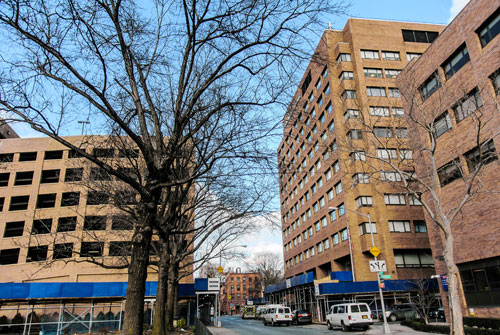The state wanted to save Long Island College Hospital and kill another beleaguered medical institution in Flatbush — before it approved the exact opposite.
A 2011 state study of Brooklyn’s ailing health care system, colloquially known as the “Berger Report,” recommended SUNY Downstate Medical Center be absorbed into its newly acquired Long Island College Hospital because the Central Brooklyn facility, which is located across the street from the mammoth, city-run Kings County Hospital, is “small and outdated.”
But by early February 2013, investment banker Stephen Berger, who was appointed by Gov. Cuomo to oversee the study, said his report was wrong.
“[There] wasn’t very much business to move to LICH and there were various obstacles in moving, frankly, any business at all to LICH, which is, after all, in a completely different market,” Berger said in a letter to university chairman H. Carl McCall.
Long Island College Hospital’s location simply isn’t working, Berger added, writing that since the 2011 report, fewer Cobble Hill residents have been going to the Brownstone Brooklyn medical center.
“This is a very difficult trend to reverse, particularly in an upscale community, where many residents probably get their care across the river,” he said.
In 2011 — when the state first acquired Long Island College Hospital — Berger and State University spokesman Robert Bellafiore were more hopeful.
“They acquired it in the hopes of making it work,” Bellafiore said. “It’s unfortunate and sad that it didn’t turn out better.”
The university bought the struggling hospital for a little more than $205 million when the medical center owed $170 million and was worth just $143 million, not counting its ample real estate assets, according to an audit released in January.
The university told the state comptroller that the deal was better than it looked on paper because Long Island College Hospital’s prime Cobble Hill land could be worth as much as $500 million, but Albany bean counters called that figure irrelevant — unless the state planned to sell the land.
Bellafiore insists Downstate has never considered such a move, and that Long Island College Hospital, which is responsible for 40 percent of Downstate’s $179-million debt, bleeds so much cash that the school might not see a nickel of any real estate sale.
“The fact of the matter is that zero consideration has been given to the real estate factor of it,” he said. “It is so cart before the horse, it’s not even funny.”
But activists fighting to keep Long Island College Hospital open claim it was a real estate deal from the start, because there is no other reason to close the Atlantic Avenue branch and keep the Flatbush location open when there is a rival medical center across the street.
“Having two hospitals right next door to each other and closing one in a place that has no others makes no sense to me,” said Cobble Hill resident Roy Sloane.
Real estate insiders say the switch at LICH and Downstate makes perfect sense — dollars and cents, that is.
The hospital facility in Flatbush would be a harder sell to developers, not least because of its untrendy location, according to legendary broker Chris Havens.
“It’s many more acres, but you’re not going to be doing condos there or apartments,” he said.
Selling and developing the land at Downstate would take years, Havens said, because of the variety of buildings on the property, and due to its lower-scale residential zoning — which allows a maximum height of 40 feet — compared with the larger “tower in the park” style zoning of Long Island College Hospital.
Activists filed suit in a bid to halt the shut-down, winning a temporary restraining order that keeps the school from taking any action to close the hospital — including talking with the state Department of Health, the agency that will make the final decision about whether the hospital can be shuttered — until a March 7 hearing.
Reach reporter Jaime Lutz at jlutz@cnglocal.com or by calling (718) 260-8310. Follow her on Twitter @jaime_lutz.


















